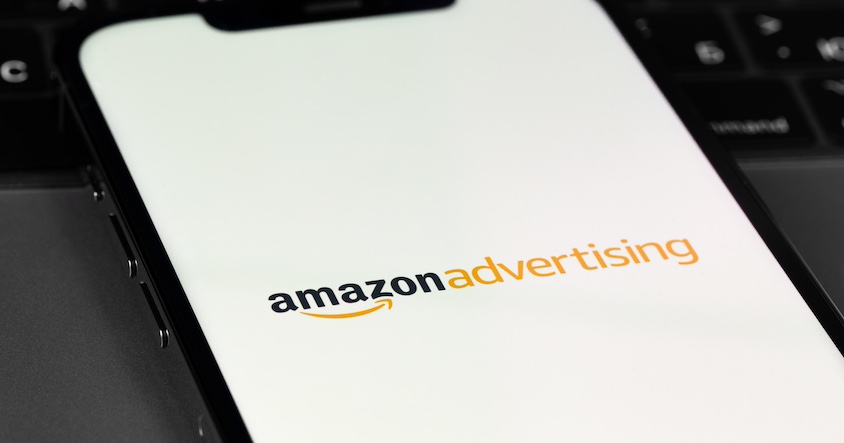Amazon Retargeting – reach customers outside of Amazon with the right targeting

Did you know that with Amazon Retargeting you can significantly easier motivate potential customers to make a purchase than if you simply let them go? On average, it takes six to seven days for buyers to make a purchase after their first product search. With retargeting, you can promote your products during this critical time window on and outside of Amazon and thus lead the customer to complete the purchase.
It wasn’t that long ago that only vendors had the opportunity to run Amazon Retargeting Ads. But since mid-2020, Amazon has offered online retailers retargeting as an additional option to display ads to clearly defined target groups.
How can you use this form of advertising for yourself and when is it worth using these ads?
What is Amazon Retargeting and how does it work?
You have probably noticed several times that just a few minutes or hours after a product search on Amazon or in an online shop, you start seeing ads for the visited product pages or similar products. At this point, many feel observed or even eavesdropped by Facebook & Co. (spooky!). In reality, it’s much simpler: The retargeting ads were displayed to you as a target person because you agreed to the processing of your data in your Facebook, Google, or Amazon account.
Retargeting is a form of programmatic advertising. In this case, the advertising spaces are allocated to advertisers beyond the boundaries of the online shop to bring the still warm customers back into the customer journey and complete the purchase. However, retargeting is not an invention of Amazon. Moreover, Amazon launched retargeting ads for sellers significantly later than, for example, the internet giants Facebook and Google.
Retargeting is a tracking method in online marketing that marks visitors of a website – usually a web shop – and then aims to address them again with targeted advertising on other websites.
Wikipedia
How is the customer specifically addressed?

With Amazon Retargeting, you focus on the individuals who have visited specific product pages or have purchased products from you in the past.
What advertising options are available to you on Amazon?
Retargeting measures can only start when there is enough traffic on the product detail pages. To achieve this, you usually need to run PPC campaigns. Amazon combines several advertising services to enable advertisers to promote their own products and brands. Before we start, we would like to make a small excursion into the terms we use below.
These advertising options are available to you as an online retailer on Amazon:
Sponsored Products
The most popular ads among online retailers on Amazon. Sponsored Products are keyword and ASIN-based ads that improve the visibility of individual products in search results and on product detail pages. Billing is done on a CPC basis.

Sponsored Brands
Sponsored Brands are suitable for increasing brand awareness and appear in search results and on product pages of the marketplace. The advertiser has the option to promote their brand at the top of the results with three products and the brand logo using Sponsored Brands. Customers can be redirected to a landing page or the store. Billing is done on a CPC basis.

Sponsored Display Ads
The difference between Sponsored Display Ads and Sponsored Products and Brands lies in the display of the ads. Sponsored Products and Brands are keyword-based and appear only on Amazon. Sponsored Display Ads use user-based data and interests and can also be displayed outside of Amazon. This gives Sponsored Display Ads a higher reach, capturing the customer where they currently are and can also be used for retargeting on Amazon. Billing is done on a CPC basis.
Advertising materials from Amazon DSP
As we mentioned earlier, DSP is a technology that allows the display of ads through programmatic advertising outside of Amazon as well. For programmatic advertising, media spaces, meaning advertising spaces, can be purchased outside of Amazon. You do not have to be an Amazon seller to run DSP ads.
To ensure that the ads successfully reach the largest possible audience and drive purchases, Amazon offers various formats. As an advertiser, you can flexibly decide whether to use your own ads or utilize Amazon’s advertising materials, such as online templates for ads or the video ad builder.
In contrast to traditional PPC ads, the billing for ads through DSP is done on a CPM (Cost-per-Mile) basis. Amazon itself points out that depending on the marketplace, you should expect a minimum budget of around $35,000. Because DSP displays ads outside of Amazon, they can be used for Amazon retargeting.
With these advertising options, you as an online retailer have the opportunity to start retargeting with Amazon DSP:
Display Ads
Display Ads are ads that contain text and visuals with a call-to-action (CTA) button and lead to a target page. The ads are typically placed at the top or side of a webpage or within the content. Here you will find a guide to creating Display Ads as well as the best examples of visuals and CTA elements.
Audio Ads
If you want to complement your display advertising strategy with audio advertising, Amazon also offers this advertising format. Audio ads can be between 10 and 30 seconds long and are played at regular intervals during the breaks between songs on Amazon Music.
Video Ads
Video ads are available for brands, retailers, and agencies. Advertisers can run these regardless of whether they sell products on Amazon or not. The ads are displayed either before or in the middle of Amazon streaming content.
Dynamics in the display of ads
Do you want more dynamics when displaying retargeting ads? Amazon DSP offers this option in the form of dynamic and responsive ad formats – Dynamic E-Commerce Ads (DEA) and Responsive E-Commerce Creatives (REC). This way, Amazon supports online retailers by allowing them to leverage the experience of the online giant without much effort on their part.
When using DEAs, Amazon selects optimal ad elements based on the product data of the respective ASIN and tests various versions of images, texts, layouts, and designs to achieve the best results with the placements.
The following parameters are automatically pulled and displayed from the respective Amazon product:
A very comprehensive guide to the visuals, the placement of ads, the guidelines, and the approval process can be found here at Amazon.

What targeting options are available to you with Amazon Retargeting?
ASIN Retargeting – Product Views
Product Views is the classic variant for retargeting ads and is very popular as it promises the highest Return On Ad Spend (ROAS). A potential buyer views a product but does not purchase it. They are targeted until they buy the product or fall out of the advertising grid.
ASIN Retargeting – Product Searches
A user enters a specific search term that is related to the advertised ASIN. Targeting can be set up for this ASIN. However, the keyword is determined algorithmically by Amazon. The online retailer has no insight into this selection process.
ASIN Retargeting – Brand Views
If a user views products of a brand within a certain period, they can be specifically targeted with ads.
ASIN Retargeting – Brand Purchases
If a user purchases a product from a specific brand and you want to present them with other products from the same brand, they can also be targeted. An option that is particularly suitable for cross- and up-selling products.
ASIN Retargeting – Product Purchases
A user orders a consumable product like dietary supplements that can be reordered at regular intervals. Therefore, they can be specifically targeted through Amazon Retargeting to encourage them to place the reorder there again.
ASIN Retargeting – Similarities Product Views
If a user views similar products from other brands, targeting can be set up for this. However, the Amazon algorithm decides which ASINs it selects.
ASIN Retargeting – Competitor Conquesting
Competitor Conquesting is a similar option to Similarities Product Views Retargeting. However, here you have the opportunity to specifically select certain ASINs. In Similarities Product Views, Amazon does this for you.
What costs can be expected with Amazon Retargeting?
Typically, you only pay for advertising on Amazon when a user clicks on your ad (CPC – Cost Per Click). With Amazon DSP, you pay for the display of the ad to a number of people X. This is referred to as “impression-based billing” – CPM – Cost Per Mille, meaning per 1,000 views.
In contrast to Amazon Advertising, with Amazon DSP you have not only the option to use the self-service method but also the managed service method. Within the self-service method, you have full control over your advertising campaign and there are no management fees. For managed services, you typically need a minimum budget of around 10,000 EUR. With this service, Amazon creates the ads for the online retailer itself and a campaign manager is provided to assist you.
You can find detailed information on how to sign up for Amazon DSP directly at Amazon.
What are the advantages of Amazon Retargeting?
What is retargeting good for?
Conclusion
Amazon is THE product search engine, which is a significant advantage for marketplace customers. However, for sellers, this means a major challenge in standing out against high competition. If you want to better reach your potential target audience, running PPC and retargeting ads is essential. This way, customers can be targeted and followed up with individual ads based on their purchasing interests.
Amazon Retargeting is just one part of the bigger picture. Running it only makes sense when a potential buyer has already viewed an Amazon item. This means you need to generate enough traffic on the product detail pages for Amazon to effectively display the ads at all.
This means that you should view retargeting as just one pillar of your overall marketing concept on Amazon. Without PPC campaigns, the concept is very likely to fail, and you will lose a lot of money due to poorly set goals.
If you want to invest your advertising budget wisely, you need to engage with programmatic advertising or bring professionals on board. One thing is clear – without marketing, it will be very difficult to reach customers with your own products.
FAQ
PPC stands for Pay-per-Click and refers to advertising campaigns where you pay per click.
DSP stands for Demand Side Platform. DSP is a technology that allows advertisers to target ads on other websites outside of Amazon, engage in retargeting, and address their own audiences such as Advertiser Audiences or Lookalike Audiences.
Retargeting is a process where potential buyers are approached again after visiting your product page to complete the purchase.
Through Amazon Retargeting, your potential customers are reminded of the purchase both on and off Amazon.
Image credits in the order of the images: © TarikVision – stock.adobe.com / Screenshot @ Amazon / Screenshot @ Amazon / Screenshot @ Amazon






